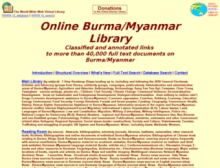Resource information
... In Myanmar, people's participation has been prioritized as an imperative of national forest policy in 1995 endorsed by the community forestry instructions (DFIs). Today, there are about 42,148 ha of community forestry (CF) management by 572 user groups (USGs). In CF management, the people are engaging three types of activities: (1) to preserve of improve the production system such as planting trees and promoting the growth of trees, (2) to use forest resources for subsistence needs, (3) to get cash by selling the timber harvested or furniture made by the timber. Initial participation by the people and their continuation of CF activities are considered to be indispensable for sustainable forest management. In practice, however, the improvement of forest management and protection are often threatened because of difficulties in continuing the activities even though initial participation was achieved. Providing secure property rights is among the major factors that contribute to continuing CF activities. Thus the objectives of the dissertation are (1) to find out the factors affecting initial participation of USG members in management actitities in Myanmar, (2) to assess the role of property rights in sustaining CF activities in the Philippines, and (3) to draw implications for Myanmar policy in terms of property rights issues from the case of the Philippines...


